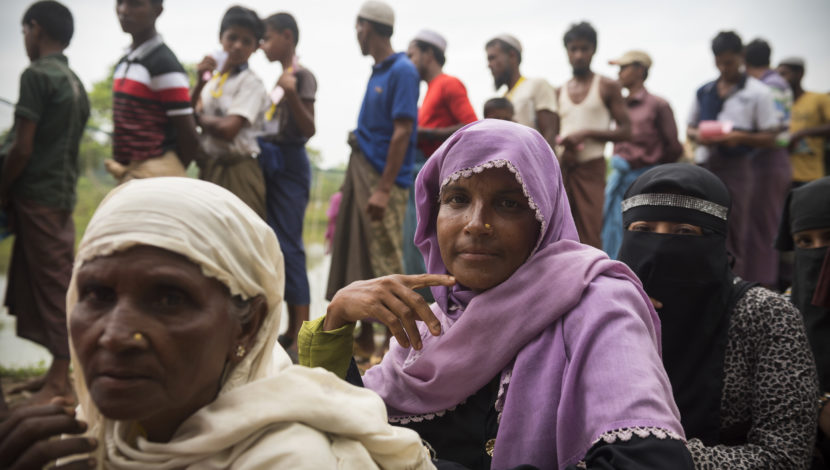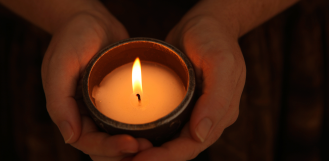The Unitarian Universalist Service Committee advances human rights through grassroots collaborations.
The Atrocities against Rohingya – One Year On

By UUSC on August 23, 2018
Immediately after the August 2017 attacks, the Rohingya people mobilized, demanding humanitarian assistance, accountability, and an end to the violence against themselves and other ethnic minorities in the country. Now, more than 905,000 Rohingya refugees remain in camps in Cox’s Bazaar, Bangladesh with no end in sight. Given that a year has passed, it is worth reflecting on the international community’s response.
The August 25 attacks were less than a year after the attacks in October 2016. At that time, after the militant group the Arakan Rohingya Salvation Army (ARSA) attacked three police outposts, the military responded, burning at least 1,500 buildings in predominantly Rohingya areas, and arresting, killing, and raping Rohingya, forcing the displacement of more than 90,000 people over two months. The government-appointed Rakhine Investigation Commission found that there was insufficient evidence of rape, and the existence of mosques proved that no religious persecution had occurred. The international response was muted.
An investigation by Fortify Rights found that as early as November 2016, authorities began, “systematically training and arming non-Rohingya residents, confiscating sharp and blunt objects, and evicting humanitarian agencies from northern Rakhine State.” On August 25, 2017, after ARSA attacked an unknown number of police outposts, killing 12, the Burmese military began its “clearance operations” the same day. Rohingya refugees in Cox’s Bazaar have themselves painstakingly counted the names of more than 10,000 dead, while an academic study estimated 25,000 Rohingyas were murdered and 19,000 were raped.
In light of Kofi Annan’s passing, it is worth remembering his contribution to the Advisory Commission on Rakhine State, which was set up by Burma in cooperation with the Kofi Annan Foundation. It issued its final report on August 18, 2017. Key recommendations were for a new citizenship verification process, documentation, rights and equality before the law, regardless of ethnicity.
The Annan Commission’s recommendations were tragically ignored—a mere week after the release of the report, the military launched its fatal operations in Rakhine State. Indeed, a government spokesperson told the Irrawaddy in July 2017 that, “[w]henever there is an accusation from the international community, we say we are taking action in line with the recommendations of the Kofi Annan commission. The commission is serving as a shield for us.”
UUSC has been campaigning for the United States to use its power to pressure the Burmese military to stop the abuses, in particular for the launch of targeted sanctions against the military officers responsible. Two Congressional bills to provide broader powers to sanction those responsible as well as humanitarian assistance have gained significant bipartisan support, but have been held up in the Senate, primarily due to the opposition of Republican Senator Mitch McConnell. Similar measures were attached to the National Defense Appropriations Act, but were not included in the final act. As of now, the United States has sanctioned only five individuals and two military units under the Global Magnitsky Act. This is a welcome step forward, but is clearly insufficient to address the vast scale of criminality that we have witnessed.
An additional prospect that haunts the Burmese military is that of accountability. The issue of the International Criminal Court (ICC) is extremely sensitive within Burma. The Burmese government has announced yet another commission of inquiry into Rakhine State, another desperate “shield” to delay action by the ICC.
The Security Council is meeting to be briefed on the situation in Burma next week. This is a rare opportunity to mobilize pressure for an ICC referral of the Burmese generals. Burma is clearly unwilling to sincerely investigate and prosecute these massive crimes and this is exactly the kind of extreme situation that the court was set up to address.
The history of justice for such serious crimes indicates that we may be waiting for years for a trial. Witnesses cannot wait—we need to preserve their evidence now.
U.S. Ambassador Nikki Haley has unique power to push for both these objectives within the United Nations. You can help her to do so. Take action to demand that she support a security council referral to the ICC and the creation of an evidence-gathering mechanism. One year on, we must do everything we can to support survivors’ calls for justice and help prevent these crimes from happening again.
Photo by Joel Carillet

